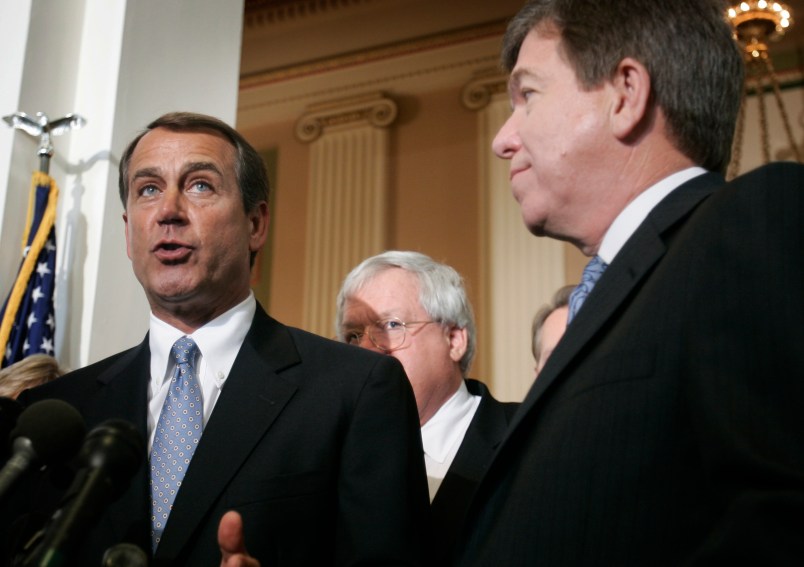A few weeks into the launch of the most sweeping health care reform law in a generation, John Boehner declared that the implementation was a disaster.
“The implementation,” the Republican leader said, “has been horrendous. We’ve made it far more complicated than it should be.”
Boehner, of course, was talking about the rollout of the new Medicare prescription drug benefit — known as Part D — enacted in 2003 by President George W. Bush. He discussed the implementation woes during a Feb. 6, 2006 appearance on “Fox News Sunday,” on his fifth day as House majority leader.
But did he want to repeal the benefit? No. The future Speaker soberly acknowledged the problems but saw potential in the law and called for improving it. “The good news is that the competition that’s being created has lowered premiums significantly below where Congress thought they’d be when we put the bill together, so the competition side is good,” he said. “I think the implementation side continues to need to be improved.”
It was a rough time for the law’s proponents. The soft launch was “anything but smooth,” according to the Washington Post, marred by at least two delays along with other, deeper problems. Upon launch, the Bush administration admitted to receiving “tens of thousands of complaints by seniors, pharmacists and others” about implementation failures. Health and Human Services vowed to “fix every problem as quickly as possible.”
Boehner was far from alone in pushing to fix the problematic law, rather than repealing or dismantling it. And his judgment was vindicated — the Medicare Part D program turned out to be a success, expanding medical coverage for millions of seniors at a lower cost than many expected. Today it is a fixture of the Medicare program. Fortunately for Bush and his party, Democrats were a willing partner in tweaking and improving the law.
Nearly eight years later, Boehner leads a Republican Party that has taken a radically different approach to the troubled rollout of a new, ambitious health care reform law — this time enacted by a Democratic president. Four weeks into its pre-launch, Obamacare is under the gun for significant problems and glitches, and Republicans took turns excoriating the law during a GOP-led hearing Thursday. But while the Obama administration wants to fix the problems, a united GOP insists that the Affordable Care Act’s online enrollment woes suggest the law should be wiped off the books, or at least dismantled piece by piece.
What Democrats are now saying about Obamacare — fix it, don’t nix it — sounds eerily similar to what many Republicans were saying on the dawning of Medicare Part D.
“This is a huge undertaking and there are going to be glitches,” said Rep. Joe Barton (R-TX) on Feb. 15, 2006. “My goal is the same as yours: Get rid of the glitches.”
“Rather than trying to scare and confuse seniors, I would hope that we can work together as we go through the implementation phase to find out what is wrong with the program and if we can make some changes to fix it, let us do it and let us do it on a bipartisan basis,” Barton pleaded during an Energy & Commerce Committee hearing on March 6, 2006. “We owe that to all of the millions of Medicare beneficiaries.”
Republican Rep. Nathan Deal, now the governor of Georgia, cautioned critics that “most significant programs” have problems early on, and that’s no reason to give up on them.
“Like most significant programs, the new benefit has not gone without a few isolated glitches and unexpected problems,” he said at the same hearing. “But I believe that if there is anything wrong with the plan, most of it has been fixed and that that hasn’t can be fixed over time.”
“Any time something is new, there is going to be some glitches,” Rep. Tim Murphy (R-PA) said on April 6, 2006. “No matter what one does in life, when it is something new in learning the ropes of it, it is going to take a little adjustment.”
Boehner’s office denies that the two situations are similar.
“Medicare Part D is a sound, popular program that faced some technical problems when it began,” an aide to the Speaker, who requested anonymity, said on Thursday. “The ACA is fundamentally flawed, and the problems with the website are just the tip of the iceberg.”










